Most effective ways bachelors in education students get finals-ready
The campus is somber, with a slight hint of tension hanging in the air. Students seek a quiet place of concentration, from the packed-out Starbucks at the student center to the quiet corners of the library. Dining hall doors stay open around the clock, providing coffee and snacks to those late night studiers who need re-fueled.
It’s almost finals week at William Woods University.
 Everyone has his or her own preferences when it comes to studying, from the locations we work to the mechanisms we use. But the question is, what study techniques are the most effective for bachelors in education students?
Everyone has his or her own preferences when it comes to studying, from the locations we work to the mechanisms we use. But the question is, what study techniques are the most effective for bachelors in education students?
A study conducted by psychological researchers at Kent State University and published by the Association for Psychological Science (APS) tested the ten most commonly used study techniques and evaluated each to identify the most effective from the least.
Findings indicated that the most successful study methods include:
- Practice testing — whether it is self-testing through flashcards or taking a practice test at the end of your textbook chapter
- Distributed practice — creating a schedule of practice that spreads your studying out over time
When we think of finals, or any big test, the first thought that comes to many of our minds is, “time to cram”. This study, however, suggests just the opposite.
“Although cramming is better than not studying at all in the short term, given the same amount of time for study, would students be better off spreading out their study of content?” asks psychology researcher and lead of this study, John Dunlosky. “The answer to this question is a resounding ‘yes’.”
Surprisingly, the techniques found to be least effective were also the methods most commonly practiced by students. These included summarization, highlighting, underling and rereading.
The remaining study practices were deemed semi-effective, and all practices, of course, can vary in effectiveness based on your area of study and what type of learner you are.
Education students can use these tips in their own studies, as well as impart them on to their future students. For bachelors in elementary education majors, and specifically those middle-level education and secondary education majors, knowing how to test what your students have learned and teach them the best ways to learn, study and retain information, is essential.

